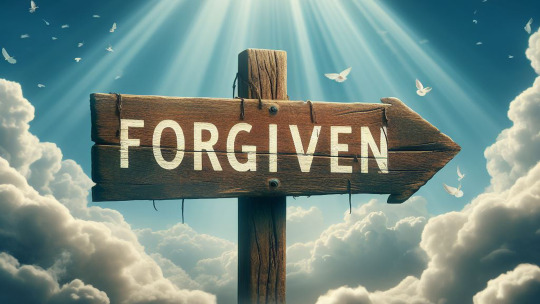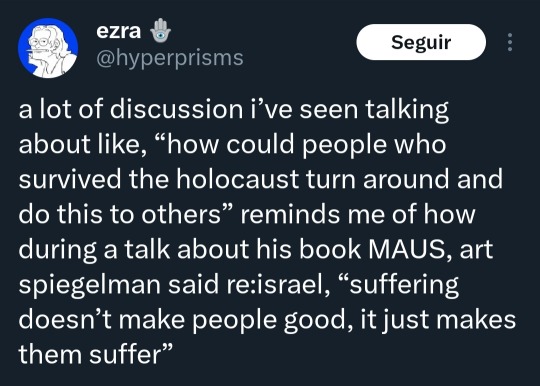#the suffering of the righteous
Text
Two Kinds of Forgiveness with God
In our relationship with God, there are two kinds of forgiveness. One is judicial and the other is parental. Judicial forgiveness is the forgiveness we receive from God when we stand before Him as the Judge of all humanity. This forgiveness occurs at the
In our relationship with God, there are two kinds of forgiveness. One is judicial and the other is parental. Judicial forgiveness is the forgiveness we receive from God when we stand before Him as the Judge of all humanity. This forgiveness occurs at the moment of faith in Christ, where “everyone who believes in Him receives forgiveness of sins” (Acts 10:43; cf. Eph 1:7; Col 1:14). This is a…

View On WordPress
#1 John 1:9#Christian suffering#Confession of sin#forgiveness#Forgiveness with God#God forgives#Judicial forgiveness#Living by faith#parental forgiveness#the suffering of the righteous#two kinds of forgiveness with God#why does God forgive
0 notes
Text

"suffering doesn't make people good, it just makes them suffer"
#gaza#palestine#zionism#art spiegelman#as a spiritist there's a whole deal there (suffering and atonement)#but speaking secularly yeah that's it#it's that type of thing that no one SAYS but many people ACT like it#the idea that there's an association between being a victim and being righteous that is
685 notes
·
View notes
Text
Being Jewish is a funny combination of being on the left while being so deeply disillusioned with The Left
#the left would watch real people die like a sporting match#to project their Glorious Revolution onto an ethnic group currently going through genocide#cheer for the eradication of a country of 7 million then say they dont care what happens to the citizens who have no where left to go#and then use the suffering of millions to talk about US politics#all while acting self-righteous in their ignorance#jumblr
512 notes
·
View notes
Text
also while we're at this jason is far less of an "unreliable" narrator than you always act like he is, you just can't accept the other bats ever fuck up.
#also the other bats are unreliable narrators *regarding jason*#but if you think jason would get over his INCONVENIENT FEELINGS#(trauma and righteous anger)#if ONLY he knew (prioritised) what the other bats suffered (about something that happened to HIM)#that's soooo not a conversation you're ready to have#talking to the void#my thoughts#jason todd#dc#dc comics#dc thoughts#bat clan#fandom nonsense#bitter lau tag
112 notes
·
View notes
Text




[ID: Ally (as Timothy): I don't know about you, but my life does get worse and worse as I die.
Brennan (as the Sea Witch): Is your life supposed to be good? end ID]
work.
#catching up!#anyway there is something about the impulse to struggle for a better life in this specific setting of stories corrupted by who knows what#namely: how much of the party's righteous anger comes from being protagonists who have endured more than their allotted share of suffering#because of what amounts to a narrative glitch‚ and as such are now entitled to reparations for being robbed of their rightful happy endings#who told you your life was supposed to be good!!#neverafter
437 notes
·
View notes
Text
My fascination and love for kuvira as a complex character vs my absolute and utter disgust for everything she stands for and represents
#truly the battle of the ages#conflicted feelings on kuvira hours lol#how mad would you guys be if i started rambling about everything i dislike about kuvira because i love you my kuvira stan mutuals#but i am also a vessel of righteous fury filled with the texts of those who suffered by the hands of those who inspired Kuvira's character#kuvira#legend of korra#tlok#the legend of korra#avatar#avatar the legend of korra#atlok
63 notes
·
View notes
Text
"God grant that we may be guided aright, and that He will deign to watch over my husband and those dear to us both, and who are in such deadly peril. As for me, I am not worthy in His sight. Alas! I am unclean to His eyes, and shall be until He may deign to let me stand forth in His sight as one of those who have not incurred His wrath."
Mina...
Mina what the fuck are you talking about?
God doesn't deserve you Mina. It doesn't.
God doesn't deserve to dangle the promise of eternal peace to you. All righteous fearing woman capable of running towards ancient evil to save your dear friend. Insessant, and intelligent fiend who is all kind towards her love, and loved him with all of her might when he was not himself.
Don't blame yourself for the assault, and never think that you are guilty for not having the means to stop it. Mina can't tell herself "if I had been better" she can't. How many times must she torture herself with thoughts of hellfire that are so close in her mind, yet far in reality.
Mina tells that she is not worthy of His sight when god should grovel at her feet for forgiveness. How dare He to make her suffer like this. Mina is not a Martyr nor a Saint. She is not Saint Inés calling for the sword to fall so she can be freed, nor Saint Águeda screaming in joy as she finally died.
Mina's suffering is not holy, it's human. It's so human that it hurts to read. How were her ambitions in life greedy to incur god's wrath upon her? Why must she become another footnote on Dracula's horrible quest for power? (Why was Lucy not saved? Why?)
Mina is losing hope in herself when she is the most strong. She can't let herself become comfortable at the idea of a violent end if it means to be seen in god's light again. Mina can't become suicidal to beg and pray to the being that abandoned her in her most traumatic moments.
Mina may think that she doesn't deserve god, but it's god that doesn't deserve Mina.
#I want to scream at her#She is not a symbol of righteous religious suffering who will be rewarded with peace in heaven#Mina is a human woman capable of so many things and she will never be at fault for this tragedy no matter how many times she tells that#If god in the Dracula novel it's real then humans should climb up and kill it#It really reminds me of a little paragraph of a song by el Cuarteto de Nos (it's an argetinian political rock band)#“I don't believe in god - all powerful - creator of heaven and earth - maker of evil and storms - castrator of willpower”#“I believe in me - nothing powerful - creator of churches and miracles”#dracula daily#dracula#mina harker#mina murray#cw catholicism
136 notes
·
View notes
Text
I've seen the same post a hundred times now. Sometimes it's a few days old, sometimes it's from years ago, but it's always the same. Some anti posts about how they don't understand how anyone can like Snape because he was so awful, and then there's a long reply that goes something like, "imagine this happens to you, and then this, and then this" to describe Snape's experience. Sometimes there's some James Potter hate thrown in.
Look. You can go through describing a character's entire experience but you don't really need to. Here's the thing that antis don't understand:
For all her faults (and they're big, bigoted ones) Rowling understood a really integral part of the human experience and conveyed it through Snape. Everyone needs love and to feel accepted. It's that simple. Snape became a Death Eater to seek acceptance (Rowling has confirmed this, though I can't remember the source - whoever wants to add it please do), because it was the only way he could find any.
Snape's understanding of morality, like everyone's, is subjective. Some readers understand this and some don't. When faced against a morality that says there is good and bad in the world, everyone makes choices based on their personal experience. Context is everything. Someone who experiences pain and suffering will not see the person inflicting it on them as moral. That's it. 'How can this person be good when they caused me so much suffering?' = human psychology. Most of the people who think 'I'm a bad person and deserve this' have been gaslit and abused into thinking so, because it's not a natural reaction - it's one that has to often be socialized into someone at a young age, exactly because it's not natural. Everyone is the hero of their own story; no one sees themselves as a villain, because they see the valid aspects of their own perspective.
You can write essays on how vulnerable people needing acceptance is what cults and fascists exploit to recruit vulnerable people, or on how the standard anti's un-nuanced reading of Snape both ignores canon and displays a disturbing lack of empathy or compassion, but at its core it just boils down to context. From Snape's perspective he experienced cruelty, therefore the people inflicting it must be cruel. Again, it's that simple. He was a person, like any other, except he was fictional so he wasn't even real. On the flip side is James Potter, who, for all his faults, didn't get to live long enough to get a chance to change and grow unlike Snape, and I think the Snapedom also needs to acknowledge that.
They're fictional characters representing things an author wants to say, not sports teams, not martyrs, and not all good or all bad emblems that define your identity depending on how you feel about them. It's depressing how much time is wasted arguing with bullies and trolls whether from the Marauders fandom or just random antis. I literally can't find more than three blogs to follow without this argument coming across my feed daily. I know the Snapedom is Not OK™ and that's kind why we're all here, and I know that my take is super unpopular but like Snape, I don't care what others think: this fandom has been having the exact same argument for years and nothing has changed. There's fanart and meta and fic and so much content out there appreciating this character, you're not going to change an anti's mind who's deliberately trolling in the tags, so why are you trying? What are you getting out of it? What does it give you? It's exhausting just scrolling past it.
#The thing about morality is that it's subjective#the religious leader who's a beacon of moral purity to their congregation#is a source of selfishness and pain to someone they abuse in secret#is that abuse victim immoral for rejecting the values the religious leader represents?#the congregation might think so because their definition of morality relies on the religious leader being a moral guide#the victim might not think so though because how can something be righteous if it causes suffering#look this is just an example of how perspectives can vary and I know there are more possible takes on that example#my point is that the idea that there's no clear 'good' and 'evil' there's only power/what you do with it is actually how psychology works#'good' to one person can be pain to another#'scourgify' is an innocuous household spell that cleans stains until it's used to waterboard someone#context matters more than labels like 'light' and 'dark' magic
46 notes
·
View notes
Text

1 Peter 3:18 (NIV) -
For Christ also suffered once for sins, the righteous for the unrighteous, to bring you to God. He was put to death in the body but made alive in the Spirit.
33 notes
·
View notes
Text
so I actually really enjoy the OG SQQ, he is such an angsty and dramatic bitch absolutely stuffed with trauma and terrible coping behind that ice cold veneer and it’s a shame we didn’t get more of him. there’s just so much to explore with him and he gets cut out and missed by his sect exactly 0% which is pretty heartbreaking.
#svsss#shen qingqiu#shen jiu#og!sqq#a guy that had the outline of a protagonist but the realism of life#orphan child taken living on the streets that has seen too much darkness to be naive but he cares for the other children in his own way#tries to survive the streets and being sold to an abusive family#his friend is saved and brought to a better life leaving him behind#he’s stuck playing the gentle toy for an oblivious girl as her brother torments him regularly#he’s abandoned by his friend and he decides to take fate into his own hands#learning cultivation from a rogue and breaking free of his chains the only way he’s learned how#with brutal and efficient violence…all by himself#he murders his abusers and the rogue who pushed him further into darkness and crime#he makes his way to a righteous cultivation sect to see his brother who he thought was lost to him in death…#…doing apparently just fine as the future sect leader of the top sect with nothing but a bright shiny future and no worries#his past and betrayals have turned him bitter and cutting and closed off but more driven than anyone else#he suffers from qi deviation and likely issues being around other men and substandard education to become head disciple and later peak lord#but no matter how high he goes all he sees is that little beaten and abandoned boy who was good enough for no one with no future#all those fancy worries and honors mean nothing to someone who did anything to survive#all the vague apologies in the world do nothing to ease the suffering he’s experienced#all the rumors and snide remarks are worth him trying to explain himself constantly - to justify his existence#and all the self loathing that has built up could have done nothing but explode upon meeting the blessed protagonist#don’t mind me#just in my feels about sqq again#mxtx why did you make this man only to throw him away??
20 notes
·
View notes
Text
Can I be a sensitive man for a minute . Seeing wild rabbits sleep in my yard laying down and sleeping under the tree next to my window makes me a little emotional. To be a part of their little comforts in life ... hold on give me a minute
#tai talks#after living in the city for the last 5 years it feels so good to see life again that isnt tainted by trash really#theres also 3 families of ducks and 2 families of geese living at my pond right now too#kinda like a breath of relief like spring is here and life goes on and the world isnt going to explode today#its kind of difficult living in a city that is just plagued with (very righteous) anger and pain like i really feed off of that#and it just makes me so miserable like it just makes me think theres nothing but misery and suffering in the world but thats not true#idk. its been a relief on me.
19 notes
·
View notes
Text
Free Books
Hello friends, every few months I’m able to give away free Kindle copies of my books on Amazon. I take advantage of this opportunity to share biblical teaching with as many as want it. Twelve of my digital books are free for five days starting April 11th through April 15th, 2023. The books are available on Amazon at: https://www.amazon.com/stores/author/B005FSY6XO
This posting will be deleted…
View On WordPress
#Book of spirituality#Book on overcoming evil in prison#book on spiritual growth#Christian suffering#do good works save?#faith alone#faith in Jesus#free Bible study books#Free Bible study material#free book#free book on spiritual growth#free books#Living by faith#Satan&039;s world system#saved by grace through faith#Steve&039;s free books#suffering#the suffering of the righteous#why do the righteous suffer
0 notes
Text
thinking about how neji spent his entire life being the victim of gross injustice at the hands of the people closest to him and being constantly told his feelings towards that injustice were invalid and being manipulated to the point that he died thinking exactly the way the system wanted him to think under the illusion that it was his free will all along

#im in pain and i feel bad for him#he like. never escaped. his emotions regarding people he loved (his father most of all) were manipulated#to make him complacent with his own suffering#maybe not actively manipulated on naruto's part but ultimately neji's emotional vulnerability as a traumatized lonely kid was what made him#so easy to steer away from his righteous anger#his skills were used and then he was discarded#ughhhhhHHHHHHHHHHHHH im upset#neji hyuga#naruto#naruto shippuden
335 notes
·
View notes
Text
WHY YOUR MORALITY IS MY PROBLEM: modern holdovers from ancient theology
James Dobson, founder of the ultra-conservative Focus on the Family organization, reputedly said of the 2012 Sandy Hook mass shooting, “I think we have turned our back on the Scripture and on God Almighty and I think He has allowed judgment to fall upon us.”
As heartless as that sentiment sounds today when addressing the murder of 20 first-graders (and 6 adults) at an elementary school, it reflects a once-common theology that emerged about four thousand years ago in the ancient near east (ANE*), then bled into the Mediterranean basin and developed an astonishingly long half-life. It’s why some Christians (et al.) are so, so concerned with what their neighbors are doing behind closed doors. Or on their front lawns with all those Pride flags.

In some ways, ANE and Mediterranean religion had a lot in common, being traditional and focused largely on sacrifice/action (orthopraxic). Over time, some orthodoxic religions also arose in that area. So, first, let’s do some quick defining.
Orthopraxic religions focus on what one DOES, not what one believes. Performing the sacrifice correctly, honoring the gods/ancestors appropriately…that’s how one shows piety. Infringing against purity laws or other affronts to the gods (impious actions) can result in expulsion from the community. Fights over correct practice can lead to schism in a community.
Orthodoxic religions focus on what one BELIEVES. Thus, they need some form of authoritative text to determine what IS right belief, resulting in the emergence of a canon (e.g., Zoroastrian Avesta, Jewish Tanakh, Christian New Testament, or Muslim Qur’an). In Orthodoxic religions, wrong beliefs (heresy) can result in expulsion from the community. Fights over correct belief can lead to schism in a community.
(There’s yet a third focus, orthopathic, but that largely doesn’t apply here. “Orthopraxic” can also apply to ethics-based religions, but here, it applies to ritual/cultic behavior.)
Most religions have elements of all three, but it matters where the weight falls. Yes, religions can emphasize two sides of the triangle more heavily, less on the third, but even then, one point will be the chief measurement of devoutness among followers. This also helps us understand why two religions might not understand each other very well sometimes. They’re trying to impose one set of “What religion is for” ideas on another, with entirely different assumptions.
The religions of the ANE and Mediterranean had much in common in terms of the purpose of religion: to maintain the health of a community. This depended on the piety of that communities’ members. Their gods weren’t moral in the modern sense, but could be jealous, fickle, and petty.
Why were they gods then?
Because they were immortal and more powerful.
Yet an important difference between (many) ANE and Mediterranean religions were the concepts of sin and “mesharum” (divine justice/equilibrium). If the latter existed (sorta) in Mediterranean society, “sin” really didn’t. Impiety differs as it can include ritual matters too. So, if murder (especially kin murder) created uncleanness anywhere and is a moral/civil matter, menstruation and sex also created uncleanness, but were not moral/civil matters defined as “bad.” So “unclean” ≠ “sin.”
To be unclean is a matter of cultic purity, different from moral purity. Yes, ANE religions also had ritual uncleanness, to be sure. And yes, some things that make one unclean also have intimations of “badness” without being so extreme as murdering someone. Yet I want to underscore the difference because it’s very real and too often ignored/misunderstood/unfairly conflated.
Many Mediterranean religions did not have “sin,” just unclean and impious. MORAL/ETHICAL matters were dictated by civil law and later, philosophic discussion. Not religion. Yet in the ANE, moral infractions were affronts to mesharum (divine order) and were therefore a religious matter. This oversimplifies, but smash-and-grab works for now. We find actions (like iconoclasm) in the ANE that didn’t often apply in the Mediterranean. (Iconoclasm is the deliberate theft, or in extreme cases, destruction of religious icons or structures.)
Yet what both groups shared was a sense that the gods had, well, “bad aim.” If people in a community were impious and/or sinful, that might draw the ire of the gods. Plagues were often seen as divine retribution for the impiety and/or sin of one or more members of that community, but not necessarily all of them. This led to the exile of impious individuals, as well as the ANE “scapegoat” ritual, et al. (If you’re familiar with the plot of the Iliad, Apollo punished the entire Greek army for the impious actions of Agamemnon.)
I could DIE from your impiety/sin committed in my town/community.
That makes your morality my business.

In addition, especially in the ANE, war on earth was believed to reflect war in heaven. Gods had cities and peoples, not the other way around. They chose you, you didn’t god-shop—hence Israel as a “chosen people.” Well, yeah, pretty much every ethnic group was chosen by some god(s). But as a result, if your side lost in a war, then—theoretically—your gods were weaker. Maybe you should go over and start worshiping their gods. Yet that didn’t sit well with most groups, so by the Middle/Late Bronze Age, we see an emerging idea that my god isn’t “weaker” than yours, rather my general “set forth without the gods’ consent,” or my god permitted the other god(s) to win for whatever reason…usually due to sin or a lack of piety among his (or her) people. Of course we find this in the prophetic literature of the Hebrew Bible, but it’s in a lot of other ANE literature too. Nabû or Marduk didn’t lose, they “went to live with” Ashur for however many years—although the winning side will portray the victory as Nabû and Marduk traveling to Nineveh to bow before (e.g., submit to) Assur.
Again, this is simplified, but we don’t see this sort of language used in Greece where Hera would bow to Athena because the city-state of Athens defeated Argos, even if, as promachos (foremost in battle), Athena might be expected to win in any conflict between the two (as in Euripides’ Children of Herakles). Hera is still queen of the gods, and—even more—these are shared deities. We also don’t see it because notions of “sin” don’t apply and only a handful of wars were ever called “sacred”—all of them concerning Delphi and cultic purity. At least one of those is mythical, the second probably didn’t happen, and the third (which certainly did happen) was labeled “sacred” only by one side. Greek gods just weren’t seen to uphold justice in the same way. Roman gods were more concerned with such things, but still not as we find in the ANE.
Ergo, the ANE faced the problem of theodicy: if god/the gods are good/just, why does tragedy happen?
Early explanations for tragedy were simple: those who suffer must have earned their suffering, sometimes referred to as Deuteronomic Theology: “good things happen to good people”/“bad things happen to bad people” (and maybe their neighbors too, by chance).
Pushback against this notion emerged around the same time a more nuanced view of loss in war emerged. People began to ask the corollary: “Why do bad things happen to good people?”
The (c. 1700 BCE) Mesopotamian Ludlul bēl nēmeqi (The Poem of the Righteous Sufferer) attempted an answer. About a thousand years later (600s-500s BCE), the Jewish Book of Job took it on as well. In both, the protagonist asks, “Why does Marduk/Yahweh punish me when I’ve been a faithful servant?” Both protagonists were previously wealthy/powerful, which was seen as divine approval. Losing that wealth/health suggested they had offended their god (and are being punished). Yet each one claims he did not sin—so why?
The answer in both works is similar: there’s not really an answer. Marduk restores Šubši-mašrâ-Šakkan, who ends the poem with a prayer of thanksgiving. Job has a chat with Yahweh, who essentially tells him, “You’re a measly mortal, don’t question me.”
The KEY element in both, however, isn’t the answer, but the assertion that a good person can suffer. They didn’t earn it; it just happened. They remained good and, eventually, their god restored them to their prior station, and then some.
Ergo, if you’re suffering, just be patient. Don’t curse God and die. (As Job is advised to do.)
Today, we may find such an answer wanting but need to recognize it for an advancement on the theology of tragedy.

Some, however, get stuck in these time-locked answers because they can’t allow their religion to grow. Or rather, they can’t acknowledge that their religion/theology evolves over time, because if it evolves, it wasn’t perfect from the beginning. And that challenges their understanding of their god.
Yet the real fly in the ointment is the notion of a perfect and infallible canon.
This brings me back around to what a canon is. It just means “an authoritative text,” but how that text is understood has nuances. INSPIRED ≠ INFALLIBLE. Most all followers of a canonical text believe it’s inspired by God, but not all (or even most) believe it’s infallible. (Islam is its own category here, note.) That creates some problematic GRAYS.
If it’s only inspired, written by humans with human foibles and history-locked understandings, interpreting it becomes complicated and can lead to disagreements. Taking a literalist view sweeps away the messiness. “God said it; I believe it; that settles it!” Black-and-white.
Those who believe in Biblical literalism/inerrancy (which includes a good chunk of conservative Christian Evangelicals and all Fundamentalists**) will argue ALL the Bible is true. If it’s written by God, it must be perfect from the get-go. Thus, a clash is created between simpler versus more nuanced views: Deuteronomy vs. Job. If an earlier view must be as true as any later one, that reduces everything to the most elementary version. It can’t evolve/grow up, yielding what feels to most like a very archaic (and often harsh) worldview.
In any case, both the traditional orthopraxic and orthodoxic religions of the ANE/Med Basin believed God/gods punished people who offended them. AND these punishments might “spill over” onto family and neighbors.
Ancient divine collateral damage.
Ironically, this is WHY early Christians were prosecuted by the pagan (e.g., traditional) Roman and Greek religious establishments. Christian failure to participate in common civic religious cult could earn divine ire. For their first two/two-and-a-half centuries, Christianity was labeled a religio illicta (illegal religion)—in part for “failure to play well with others.” E.g., make sacrifices to the appropriate Greco-Roman deities. Thus, when disaster struck, a scapegoat was sought. Those antisocial Christians are to blame! They don’t sacrifice to the gods and so, offended XXX god, who is now punishing ALL of us with YYY.
Classic ancient religious thinking, but it’s one reason I find current conservative Christian opposition to Teh Gays, trans folks, etc., enormously ironic. The persecuted have become the persecuting.
I want to emphasize that large sub-groups of Jews, Christians, and Muslims have evolved past such theologies. Yet others have not and stubbornly cling to ancient mindsets. That’s why they argue the mere presence of LGBTQI+ people will bring down the wrath of God on ALL.

Talk of “grooming” and “protecting children” is just an attempt to make palatable a belief they know won’t fly with most people, who they consider deluded by The World (e.g., the devil). Trickery is therefore required. As they’re deeply afraid themselves, they understand fear and use it to motivate others. Many are perfectly happy to make their beds with “unbelievers” long enough to get their agendas passed. God will forgive them.
This, too, is rooted in ancient ideas (discussed above) whereby a people’s own god might employ the enemy to punish them (or others). Thus, a sinful person can be utilized on the way to righteous ends because the victory of God wipes away all else. Using the enemy to effect God’s will just proves that God is in final charge of everything after all. It’s the ultimate PWN.
I hope this helps to explain where these ideas come from, how they originally emerged, and why a subgroup of people still cling to them.
————-
* While Egypt influenced the ANE, as well as Greece and Rome, and is often shoehorned into the ANE, I consider Egypt as NE Africa. It deserves to be treated on its own, or in relation to neighbors such as Kush.
** Fundamentalists and Evangelicals tend to be equated but are not the same. Also, not all Evangelicals are conservatives (although all Fundamentalists are, by definition). Enormous variation exists between Christian denominations, which range from ultra-conservative to (surprise!) ultra-liberal. There is as much of a hard Christian Left as there is a hard Christian Right. We just tend to hear far less about them.
#iconoclasm#mesharum#deuteronomic theology#book of job#poem of the righteous sufferer#ancient theology of tragedy#theodicy#ANE theology#ancient Mediterranean theology#Classics#ancient near east#ancient religion
25 notes
·
View notes
Text
Fix it fics where Warren J Kepler lived and then had to deal with the consequences of his own actions >>>>>>>
#let that man suffer#put him back on earth with NOTHING#only righteous hatred from Jacobi#let him regret everything for the rest of his days#his ambition means nothing#hes my poor little meow meow#<3 and i want him to suffer#w359 kepler#wolf 359 kepler#warren kepler#w359#wolf 359
75 notes
·
View notes
Text
It just blows my mind that in the past two months I've seen people handing it to Hamas, the Houthis, and fucking Osama bin Laden, just shamelessly throwing behind open antisemites that will loudly and repeatedly scream their hatred for Jews and murder innocent people that have not themselves done anything. Hamas killed at least 700 random civilians including people that weren't even Israeli! The Houthis drove out Yemen's Jewish population in 2021! Bin Laden's fucking letters repeatedly blame The Jews for everything when he's not discussing the evils of homosexuality!
People spread blogs that literally just repost antisemitic conspiracies with the word Jewish swapped out for Zionist, hold up far right antisemitic groups, boost far right bigots like Jackson Hinkle and atrocity deniers that supported all kinds of murder (including of Palestinians) as long as it was done in Syria, then act shocked that after steeping their brains in this rhetoric they keep falling for antisemitism.
None of that helps Palestinians. It sure as hell doesn't bring anyone over to campaign for them or rally support for the victims or do anything but make life more dangerous and unpleasant for Jewish people.
The attack on Gaza is wrong because human life is inherently valuable and there is never an excuse to kill thousands of people. There is never a good reason to destroy homes and ruin lives, there is never a good reason to displace millions. Opposition to the Israeli government's crimes against humanity and to the US government's support of Netanyahu is basic morality, their actions are inexcusable. This is not a hard position to maintain without endlessly handing it to antisemites and people need to give it a try.
#eri talks#people revel in death and the concept of righteous violence more than they care for life and by God does it show#my position will always be locked in on reducing death and suffering as much as possible#violence happens and is sometimes even necessary but mass killing of helpless people never is#holding that position has yet to steer me wrong
8 notes
·
View notes